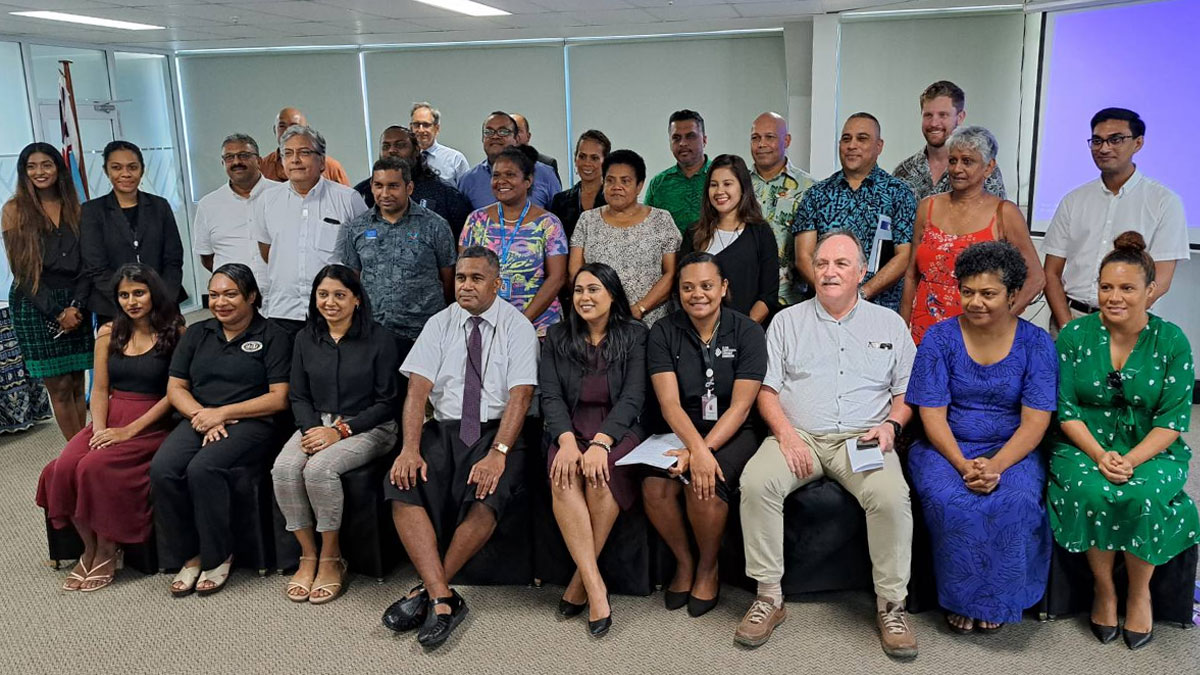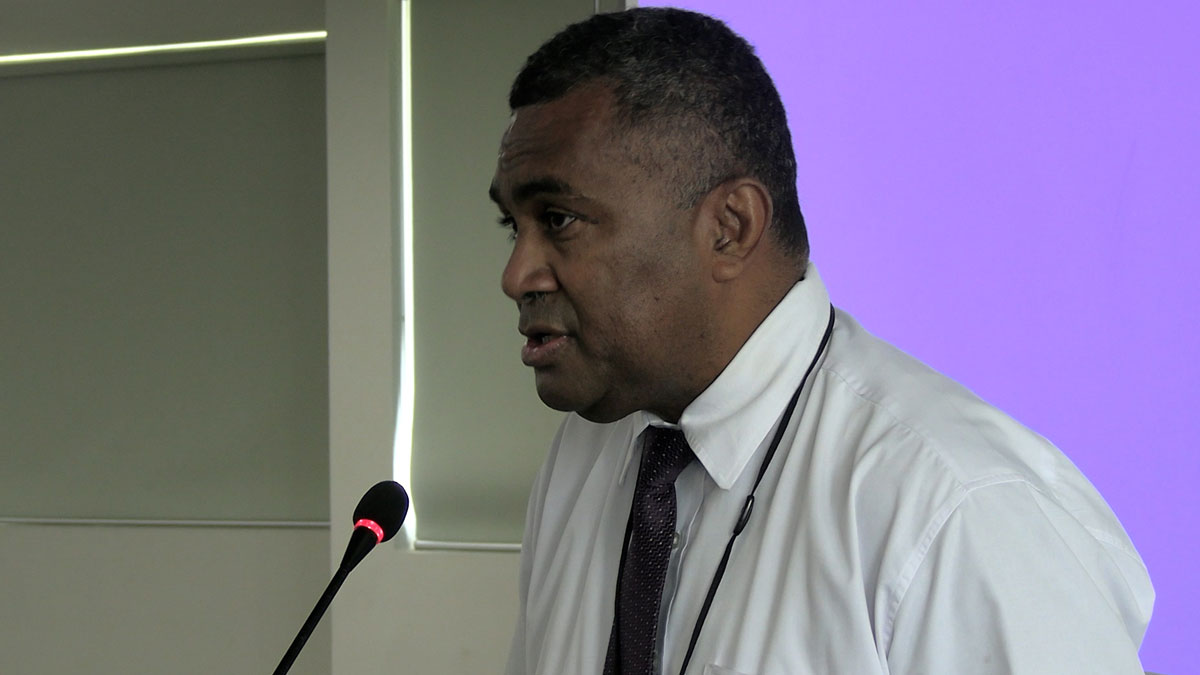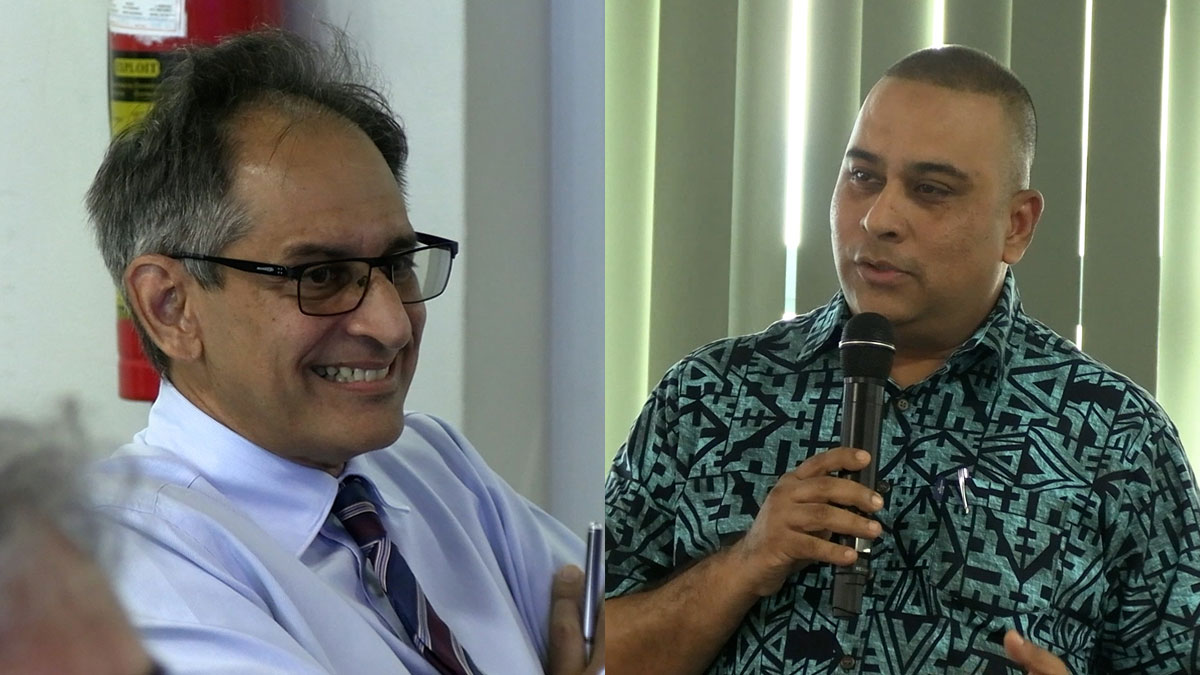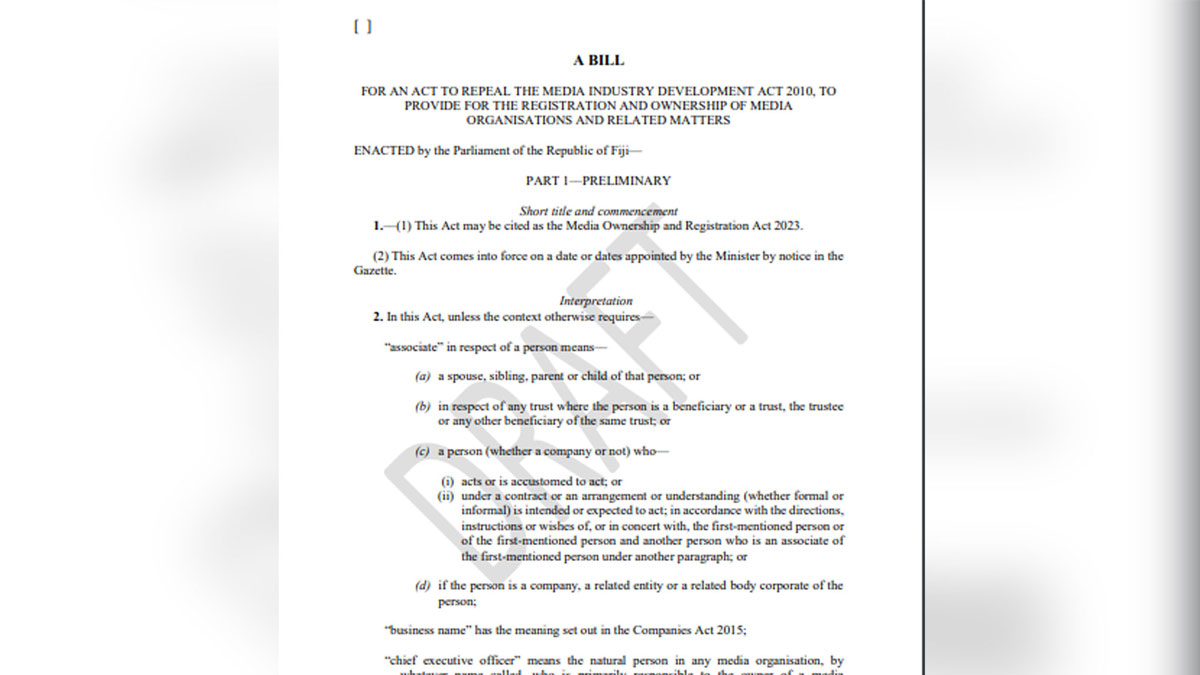
The Fijian media industry has strongly called on the coalition government to repeal the Media Industry Development Act which first came as a decree in 2010, and to stick to the promise they made during the campaign period.
In a submission signed by Communications Fiji Limited Chair William Parkinson, Fiji TV Limited Chair Deepak Rathod, Fiji Times Limited General Manager Christine Lyons and Fijian Broadcasting Corporation Limited General Manager Tarun Patel, the media organisations say they cannot see the need to separately register the media and it appears to be based on the practice of registering newspapers that dates back to the 19th century.
They say all media organisations are already registered as legal entities, like most businesses, as incorporated companies both public and private.
The media owners say any attempt to separately register media organisations opens the possibility of intimidation through potential deregistration.
The organisations further say the cross media ownership provision appears to be out of date and the current reality is that all media organisations are already cross media entities with online presence in various forms.
They say by removing this restriction, it will free up all media organisations to fully achieve their potential increasing, not decreasing, competition to the benefit of the readers, listeners and viewers.
The organisations also say that at a time when Fiji is actively seeking new investment, they cannot understand why the Fiji media industry should be denied the opportunity to attract foreign investment.
They say if the industry is to grow and develop, foreign investment both in terms of capital funds and knowledge is critical.
The organisations say the media industry has faced, over the last 16 years, unprecedented political interference and control and they are desperate to get on with the task of rebuilding the industry and profession and this can only start with repealing the Media Industry Development Act.
Speaking on behalf of the media owners, CFL Chairman William Parkinson says we should start with a clean slate and then start a wider conversation whether there is a need for regulation and are these issues covered under other forms of legislation or control.
He says there should not be any involvement of politicians or bureaucrats in the Fiji Media Council and as before, it should be community driven and it does not need a legislation.
Fiji TV Chairman, Deepak Rathod says the reasons these provisions in the Act was brought in did not have validity and they should forget about it.
Consultation on the Draft Media Bill which was partly drafted by prominent lawyer, Richard Naidu was held at Suvavou House today, with majority of the speakers wanting a total repeal of the media legislation.
Solicitor General, Ropate Green says the consultation phase is important as they will take the public submissions to cabinet for the final decision before any bill goes to parliament.
Green also says they understand how the Media Industry Development Decree came into place in 2010 without consultation, and encouraged the participation of the public to get the best outcome.

Solicitor General, Ropate Green says the coalition government is committed to reviewing the Media Industry Development Act to remove certain controversial provisions in response to concerns raised by relevant stakeholders.
While delivering the opening remarks on the first public consultation on the draft Media Bill, Green says they are here to listen to their voice and listen to what they have to say in relation to the Bill.
He says once the public consultation is completed, they will incorporate all the comments into the draft Bill and submit a paper for the cabinet to endorse the Bill before it is tabled in Parliament.
Green says after this, parliamentary processes will take its due course.
Prominent lawyer Richard Naidu who also partly drafted the Media Bill says the media has legitimate viewpoints that the government has to consider and there is a balancing to be done. Naidu says the views have to be taken into account and the government has got to decide what is the right balance.
He adds the government will not try to regulate the content in any way which is a very positive thing for free speech.

The Fijian Media Association in very strong terms is calling on the coalition government to completely repeal the Fiji Media Industry Development Act and have fresh consultations on a new proposed document, if any.
While speaking on behalf of about 150 media workers during a consultation on the draft Media Bill, Communications Fiji Limited’s News Director and FMA Executive, Vijay Narayan says the media workers have had to live with this law that was forced through in the form of a Media Decree in 2010 after a few hours of ‘consultations’.
He says the workers in the industry have suffered a lot and have been facing the pointed end of the spear on a daily basis.
Narayan also says they need investment and growth so they can do more.
He says with this new draft, they understand that the content regulation is completely out however, the restrictions on overseas investment and cross media also stunts their growth as media workers.
Narayan says there is also a real fear because of the fact that legislating media registration will be controlled by politicians and there can be a huge risk of de-registration if any government is unhappy with the news reporting of a media entity.
The FMA Executive says the previous government that took the Fiji Times to court did not take issues through the Media Industry Development Act but through various laws already in place.
He says there are different rules that have already been tested and have been used.
On cross media, Narayan says they as media workers agree that there should be a level playing field that this government preached about and all the industry players agree that there should be no cross media laws.
He asks why should there be a law that maintains an uneven playing field.
Prominent lawyer Richard Naidu who says that he had some input in the draft Media Bill says all aspects in terms of the news media should be opened up.
He says the Defamation Act which is now 50 years old needs comprehensive review and it does not give enough latitude to journalists to go out and demand accountability from public officials.
Naidu says Crimes Act, issues of online safety and privacy need to go through a much wider consultation.
He says the point has been made that if you allow foreign ownership, you get better investment and better input and possibly a stronger news media but on the other hand, not all foreign ownership is benign and they need to be a bit more careful about what they wish for.
Naidu says the priority in this Bill was to get rid of all the content regulation in the Act and that is done and he hopes that the concerns of the journalists are addressed as there is no Media Tribunal and Media Industry Development Authority.
He says he agrees with media organisations that the idea to restore the Media Council is a great thing and it should be media driven and government should not have a real role in it.
He says the problem with going to the Media Council previously was that if someone went to them, they waived their legal rights and could not go to court.
Naidu says bringing this process back is a good thing and deals with the issue of content.
He says a valid view point has also been raised about registration.
The Fijian media industry with the FMA have called on the coalition government to repeal the Act and if there is a need for another law, then it should go through consultation and due processes.
You can watch the videos of the public consultations on the Draft Media Bill on our website, fijivillage.

The new media legislation proposed by the coalition government is aiming to preserve the elements of media ownership regulation and registration contained in the current Media Industry Development Act for now while eliminating the restrictive and draconian content regulation provisions of the Act.
The coalition government will have public consultation on the draft Media Ownership and Registration Bill 2023 this Thursday that seeks to amend the Media Industry Development Act 2010.
In the case of every media organisation registered under the Act, the editor must be ordinarily resident in Fiji; and at least 90 percent of its ultimate beneficial ownership must be held by citizens of Fiji who are ordinarily resident in Fiji.
If a media organisation is at any time in breach of this for a period of more than 30 days, that media organisation and every ultimate beneficial owner of the media organisation commits an offence punishable, in the case of a natural person, to a fine not exceeding $10,000 and in the case of a company, to a fine not exceeding $50,000.
The draft Bill further states that a media organisation may only operate a media service using one medium, and where a person or an associate of that person has ultimate beneficial ownership in any one media organisation, that person may hold ultimate beneficial ownership in only one other media organisation operating in a different medium, not exceeding 5 percent of the total ultimate beneficial ownership of that media organisation. The cross media law does not apply to a media organisation in which the State owns a majority shareholding.
In this case, only the state owned broadcaster, FBC continues to enjoy the cross media exemption as allowed in the current Media Industry Development Act where the government owned entity is operating radio and television stations.
The Bill says the operation by a news organisation of websites or social media pages shall not be considered a “different medium” if such websites or social media pages comprise or support a media service of that media organisation or contain substantially the same content as that media service.
Any media organisation or any person in breach of any provisions of this part shall be liable on summary conviction in the case of a natural person to a fine not exceeding $10,000 and in the case of a company to a fine not exceeding $100,000.
The draft Media Bill also says no media organisation or officer of a media organisation which is a public listed company shall be liable for the offence if that person proves to the court, on the balance of probabilities, that the person had no actual knowledge of any matter in relation to the sections comprising a breach of the Act.
The proposed law says it is fair to say that even the ownership regulation and registration provisions contained in the Bill may be viewed as unnecessary or even restrictive.
It says whether these provisions remain in future is a matter for wider consultation.
The proposed law says the principal purpose of retaining the registration requirements is to ensure that mainstream media organisations remain legally accountable as such; and that anyone wishing to take legal action against them (whether in civil proceedings for defamation or any criminal proceedings) is able to ascertain from the public record (and the organisations’ own websites if any) the persons who are legally responsible for publication of any impugned content.
It says this reflects the purpose of the old Newspaper Registration Act (Cap. 106) which was repealed by the Act (but whose elements were retained in the Act).
It further says changes to cross-ownership rules belong to the wider consultation process.
Monday 20/03/2023

The explanatory notes of the draft Media Bill states that it is not intended as a complete reform of Fiji’s media law landscape.
It says wide-ranging and more comprehensive consultation will be required on this, to take into account required changes in laws concerning defamation and personal privacy, new technologies and new platforms such as social media.
The coalition government also says consultation on foreign ownership and cross-ownership rules for media services will also be necessary.
It says for now it is necessary to free Fiji’s mainstream news media from the restrictions under the current Media Act.
The draft Bill says as a commitment of the Government to address issues that are undemocratic, threatens the freedom of expression under section 17 of the Constitution and hinders the growth and development of a strong and independent news media in Fiji, the Media Ownership and Registration Bill 2023 seeks to amend the Media Industry Development Act 2010 accordingly.
It also says any excessive concentration of ownership in a medium would ordinarily be regulated by the Fijian Competition and Consumer Commission Act 2010.
The Bill also says prosecutions may only be brought within six months of the commission of any offence and may only be brought with the permission of the Director of Public Prosecutions.
The purposes of these limitations (which existed in the Act) are to avoid or at least limit, as far as possible, any unnecessary or politically-driven prosecutions against media organisations.
It says prosecutions must be timely and the DPP has the right, in the exercise of his own judgment, to decline to proceed with a prosecution.
Stay tuned for the latest news on our radio stations
